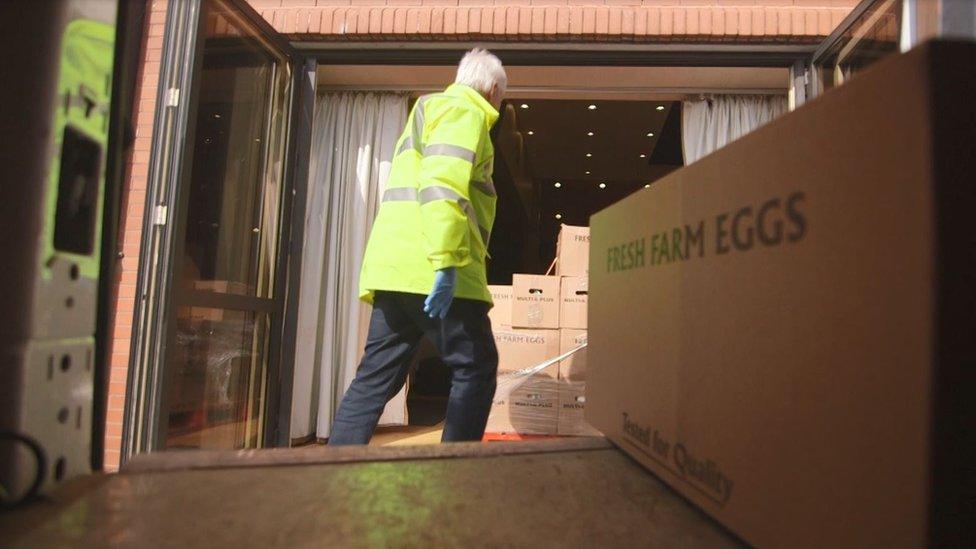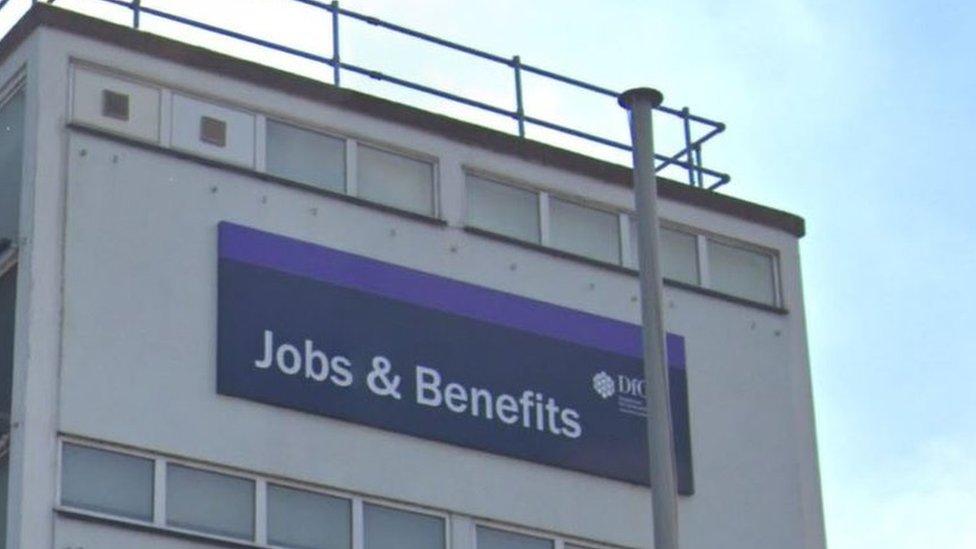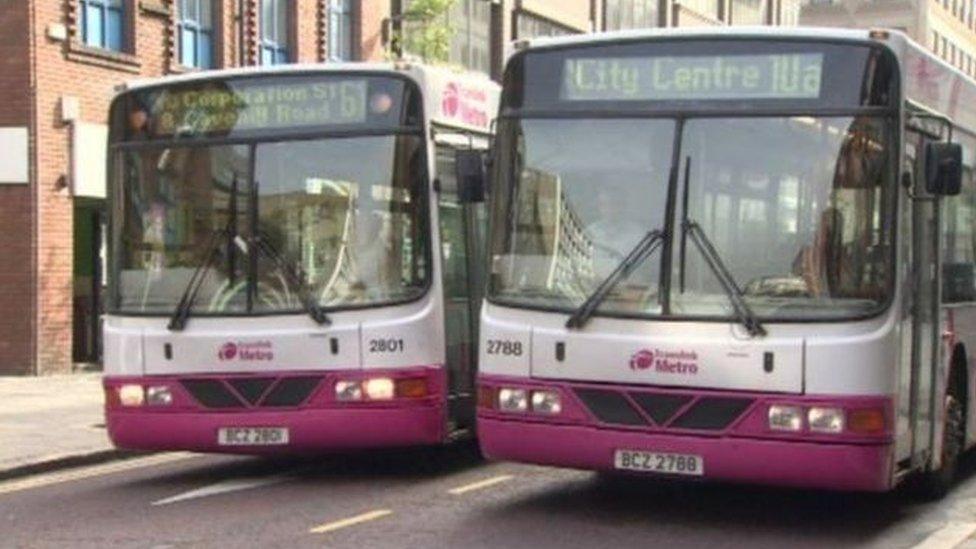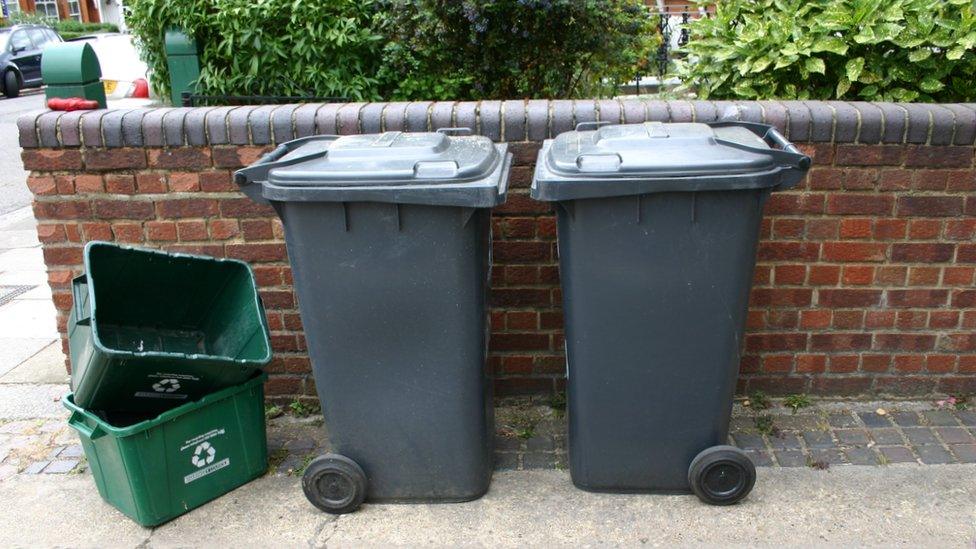Coronavirus: 'Huge challenges' for NI recovery from Covid-19
- Published

The retail sector has been badly hit
There will be "huge challenges" for Northern Ireland's economy in the future because of the Covid-19 pandemic, Arlene Foster has warned.
The first minister cited recent unemployment figures in NI, which rose by almost 90% in April.
Mrs Foster said she has "real concerns" about what will happen to workers when the government's furlough scheme ends.
It was due to run until June, but has since been extended to the end of October.
The scheme allows employers to temporarily lay off staff while the government pays 80% of their wages during the crisis.
'Thousands of council staff furloughed'
Appearing before Stormont's Executive Office committee, Mrs Foster said if NI businesses had not been able to avail of the furlough scheme, unemployment figures would have been "much worse".
She said: "What happens to some of those jobs when the scheme comes to an end and is tapered away, how can we support those people?"
"We're in the response phase, when we move to the recovery and renewal phase, there will be huge challenges."
Her comments came as the Communities Minister Deirdre Hargey revealed more than 2,500 staff in Northern Ireland's 11 councils are being furloughed.
Her department is providing emergency funding of £20.3m to councils, as some of them are at risk of becoming insolvent.
Sinn Féin councillors are challenging a Causeway Coast and Glens Council Borough Council decision to place some staff entirely onto the job retention scheme.
That local authority voted to furlough 60 workers, but Sinn Féin wants the council to pay them the other 20% of their wages.
The DUP has said the challenge could lead to jobs and services being cut because the council is in a precarious financial position.

In other developments on Wednesday:
There have been a further five Covid-19 related deaths recorded by Northern Ireland's Department of Health, bringing its toll to 494
The toll rises when you count death certificates that mention Covid-19 and statistics agency Nisra recorded 599 deaths by 8 May
A new action plan to improve mental health services in Northern Ireland includes a "dedicated Covid-19 response"
Want to find out more about contact tracing in Northern Ireland? Read our guide here
BBC News NI's explainer about what you can do in Northern Ireland, as the first lockdown restrictions are eased

Ms Hargey also gave more details about her department's scheme to distribute food parcels to vulnerable people.
By the end of this week, more than 100,000 parcels will have been distributed in Northern Ireland since the start of April.
The minister said she recognised that Treasury funding to mitigate the effects of the pandemic was not limitless.

Parcels were first piloted across the Armagh, Banbridge and Craigavon area
"While we are all focused on moving out of this crisis situation and embarking on a phased approach to recovery, it is very clear that we will have a... very different society at the end of this process," said Ms Hargey.
She warned there could be programmes in some departments that "may not come to fruition" this year.
"Of course, we will look at other ways we can generate income, we had already been looking at these options ahead of the Covid-19 pandemic," she added.
The executive will have discussions with Treasury to see if additional powers to raise revenue could be transferred back to Stormont, the minister said.
'Covid-19 permanent memorial'
Earlier on Wednesday, a Sinn Féin assembly member urged the executive to consider creating a "permanent memorial" to mark the loss felt by people in Northern Ireland due to Covid-19.
Pat Sheehan told the Executive Office committee that funerals, and the grieving process for many people, had been disrupted and that those who had died should not "end up as statistics somewhere".
Deputy First Minister Michelle O'Neill described it as a "very good suggestion" for the executive to explore.
"We'll all remember it - a lovely memorial would be positive for us to do when we get to the other side of this," she said.
Mrs Foster added that it was important to have the conversation about marking the pandemic in a sensitive way.
"Many people have suffered throughout this period of time and people haven't been able to grieve properly," she told the committee.

EASY STEPS: How to keep safe
A SIMPLE GUIDE: What are the symptoms?
CONTAINMENT: What it means to self-isolate
HEALTH MYTHS: The fake advice you should ignore
MAPS AND CHARTS: Visual guide to the outbreak
VIDEO: The 20-second hand wash

- Published19 May 2020

- Published19 May 2020

- Published20 October 2020

- Published5 May 2020
